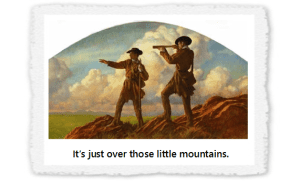
- We should consider it an asset how exploration and discovery are such a recent and important part of our country’s DNA.
Several years ago I loaded up everyone into the family truckster and headed west. Actually we spent our first night in Weston, Missouri and then traveled up into Nebraska, South Dakota, Montana, Idaho and Washington. 8300 miles total. Yes, we followed the general route of the Lewis and Clark expedition, but instead of flat-bottomed boats and canoes we traveled in a peculiar-smelling Chrysler Town & Country mini-van.
Thanks to Google Maps we knew exactly where we were going. And thanks to modern technology, we even knew where to find two-headed baby goats and every world’s largest ball of string between Fayetteville and Vancouver. Lewis and Clark, however, did not have the luxury of Google Maps. As a matter of fact, their expedition was based on the belief that they could float up the Missouri river from St. Louis and when they reached the western end of the river simply carry their canoes to the nearby Columbia river and float happily to the Pacific ocean. Whoops.
In what must have been a heart-dropping moment, Lewis Merriweather got a drink from the rivulet that eventually becomes the mighty Missouri, looked toward the setting sun and proceeded to write in his journal: “…I discovered immence [sic] ranges of high mountains still to the West of us with their tops partially covered with snow.”
Tod Bolsinger is a seminary president and pastor and author of Canoeing the Mountains. He finds fascinating similarities between the dilemma of the church today and the Lewis and Clark expedition. No, we cannot paddle across those mountains. According to Bolsinger, Christendom as we know it is done. Our faithful canoes will no longer move us forward. The world in front of us is nothing like the world behind us. And he builds his book around the leadership principles demonstrated by Lewis and Clark that need to be practiced by pastors and other church leaders.
For churches today – traditional or newly planted – we face extraordinary challenges and extraordinary opportunities. And adding to Bolsinger’s terrific guide to leadership in this new world I’ve learned a few lessons of my own:
Intentional efforts to discern God’s will are necessary, as well as the choice to trust the outcome of these efforts. God is still in love with this world and is eager to see lives transformed, we simply have to listen and not just rely on what we’ve done in the past.
Similarly, innovation, creativity and adaptability are essential – even for people who have been steeped for decades in Christendom’s tried-and-true methods. I wonder sometimes if we’ve fluffed pillows and delivered casseroles and pastoral-cared one another to death – at the expense of the wild, wonderful and unpredictable challenges of following Jesus on his next grand adventure.
Collaborative leadership will mean the end of the professional, ‘designated’ Christian but will empower everyone to become leaders. Pervasive Christendom could afford to trust a few to do the work of many but in today’s terrain we need everyone to pull their weight.
An open and high-expectation reliance on the ongoing work of the Holy Spirit is essential. It is imperative that believers of every heritage and flavor get comfortable with the incredible, supernatural gift they have been given. We cannot find our way to the Pacific without the risen Christ traveling with us and the world definitely needs something bigger than themselves.
Pray for me and my church and I will pray for yours. And even as you cross high mountains do not be afraid, for He is with you even unto the end of the age.
